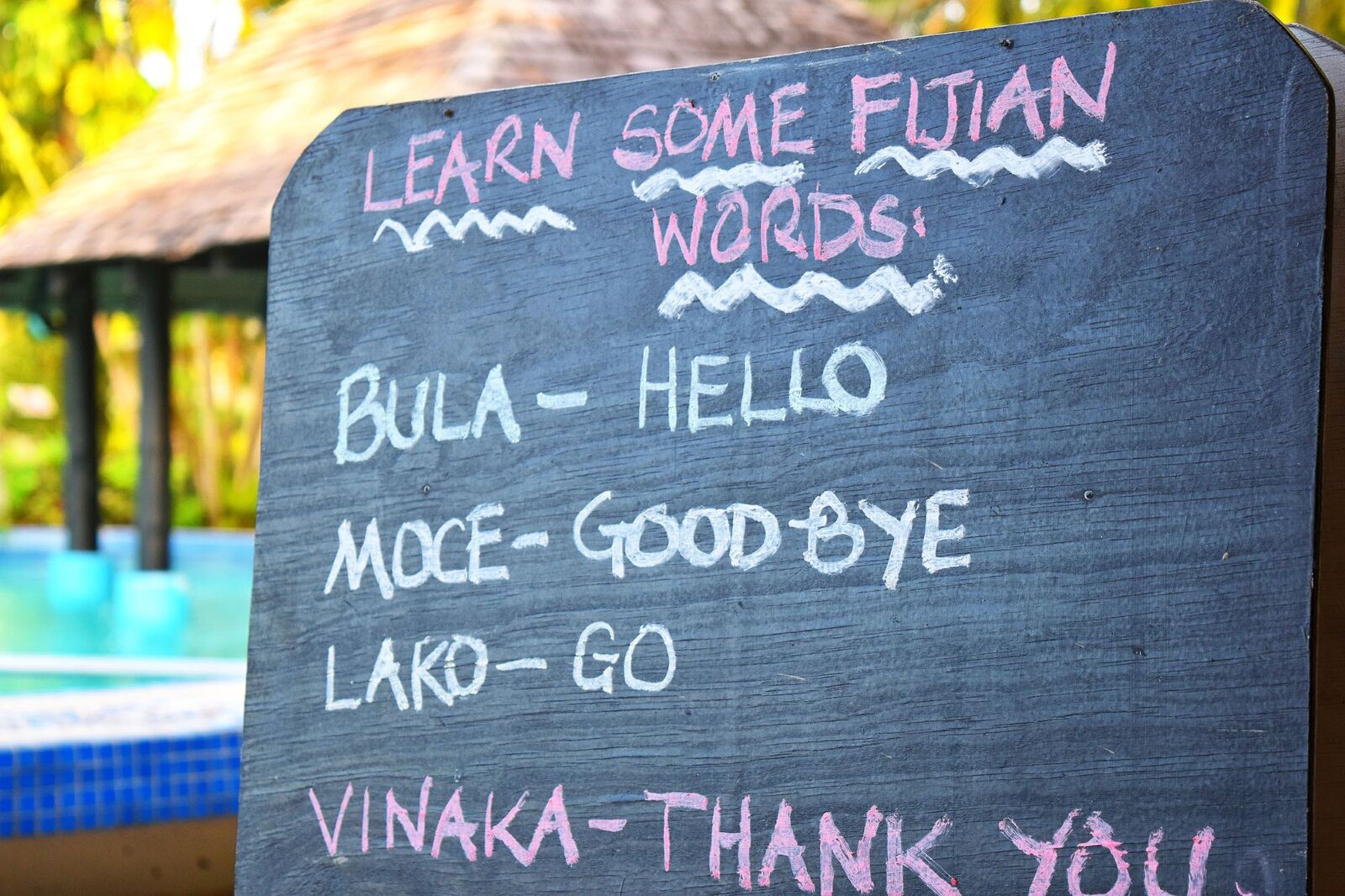Learn Some Fijian Words!
Travelling is all about exploring different cultures. One of the basic ways to get started on becoming immersed in new surroundings is to start speaking the local language. Don’t get us wrong, you don’t need to be fluent in Fijian to get by in Fiji. Everyone speaks English. In fact, the three main languages in Fiji are Fijian, English and Hindi. In the meantime, learn some basic words in Fijian to put a smile on the locals’ faces (not that they need much help with that) and because, well, it just feels good! Give it a try with these 10 Fijian words to learn for visiting Fiji!
First thing’s first, you will need to know how to pronounce words in Fijian. On top of having slightly different vowel sounds to how you pronounce them in English, which you can learn more about in our Guide to the Fijian Language, other differences include that “d” has an unwritten “n” in front of it. The city of Nadi, for instance, is pronounced “Nandi”. Similarly, words with a “g” have an unwritten “n” in front, making words like “sega” pronounced “senga”. Our favourite, “c” is pronounced “th”, so the “Mamanucas” is pronounced “Mamanuthas”.
If you find this article useful, you might also like our guide to Understanding the Fijian Culture, as well as Who are the People of Fiji.
1. Bula!
Means “hello” or “welcome”. This is the word you will hear the most while in Fiji! You’ll see locals saying it with a big smile, so do the same! To be polite, always return a bula with a bula. Another pronunciation tip: “b” is pronounced “mb” as in ba”mb”boo, so you will be able to hear this pronunciation when some locals say bula.
2. Vinaka
Means “thank you”. Again, this is another one you will want to say all the time when experiencing Fijian hospitality. When someone says vinaka after you have said vinaka, that’s a response to say “you’re welcome”. Vinaka Vaka Levu means “thank you very much” and Yalo Vinaka means “please”.
3. Io / Sega
Means yes / no. Simple, right?! Remember that the pronunciation of sega is “senga”.
4. Kana
Means eat! Personally, we think that that’s the most important word wherever you are in the world!
5. Gunu
On a similar note to kana, gunu means to drink. And that’s the second-most important word.
6. Kava
Refers to a traditional Fijian drink. You’ll hear this word a lot in Fiji, as the locals are mad about kava! It’s so important to the Fijian culture that kava ceremonies are performed when new visitors arrive in a village. On that note, it is customary to bring kava root when visiting a village, as it is rather expensive to buy. The drink has an earthy taste and leaves the lips and tongue feeling numb. Have too much kava, and your head will probably go numb too. Check out our Guide to the Fijian Culture and Guide to Fijian Village Etiquette for more advice.
7. Vaka Lailai
Means “a little”, as in: “I will only have a vaka lailai of kava.” You’ll also notice that many island names in Fiji end in “Lailai”, like Malolo Lailai and Waya Lailai, meaning “little island”.
8. Vale Lailai
Meaning “toilet”. It’s always a good word to know, especially in desperate situations.
9. Sitoa
Means “shop”. You know, those places where you buy things? Learn more about shopping in Fiji with our Where Can You Get Your Essentials in Fiji?
10. Dua / Rua
Means “one / two”, as in: “One cocktail for her, two beers for him.”
More About Fijian Words and Culture
That’s it for the Fijian words to learn. For more cultural insights, check out The Guide to the Fiji Culture for Travellers.
Author
Robin C.
This article was reviewed and published by Robin, the co-founder of Fiji Pocket Guide. He has lived, worked and travelled across 16 different countries before settling in the South Pacific, so he knows a thing or two about planning the perfect trip in this corner of the world. Robin is also the co-founder of several other South Pacific travel guides and is a regular host of webinars with the South Pacific Tourism Organisation.

